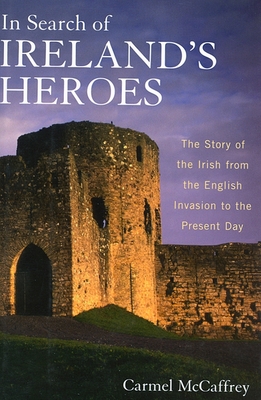In Search of Ireland's Heroes
Ruaírí Ó Domhnaill reviews In search of Ireland's Heroes: the story of the Irish from the Norman invasion to the present day by Carmel McCaffrey, Ivan R. Dee (publisher) US$26.95

THIS IS a companion volume to the acclaimed In Search of Ancient Ireland, written by Ms McCaffrey and Leo Eaton.
It is a narrative history rather than a collection of biographical studies. The publishers claim that it is based on original sources, but give no footnotes for guidance.
Describing almost eight hundred years of history is a vast undertaking and no major events are excluded. However the work embraces a number of neglected topics, which were pivotal in Irish history, e.g. abolition of Gaelic monasticism: Irish reasons for adhering to Catholicism: Act of Union and absentee landlords, and the planning of the Constitution of 1937.
Heroism, like beauty, is in the eye of the beholder. For example in 2007, Ireland celebrated 'The Flight of the Earls', which may conjure up romantic visions; Ms McCaffrey laments the fate of the "dispossessed chieftains." These "earls" were vassals of the English crown, renegades and traitors to their kin.
The account of An Gorta Mór is well-researched and well-written reflecting The Famine's catastrophic impact and consequences.
Religion has an essential role in Irish history, and features here, literally, from the first to the final paragraph, but the author manages the topic commendably.
Variations in religious practices were not unique to Ireland. Bertrand Russell in The History of Western Philosophy (1967) argued that local digressions were endemic in the 12th century church and that the papacy made concerted efforts to eradicate them.
To state it crudely, Norman power was utilised to establish papal hegemony over 'Irish' Christianity. Professor Donnchadh Ó Corráin, maintained that submission of Irish monasticism to the papacy in 1172 was: "a triumph for the administrators and a disaster for Irish literature and general culture. The reformers destroyed the social, economic and cultural base of Irish learning." It may be that the Pope rather than the marauding Vikings ended our 'Golden Age'.
The Brehon Laws were also an integral part of Gaelic life; they followed neither Roman nor Anglo-Saxon models. In Ireland there was no 'divine right of kings'; all were subject to the same law. This effectively obviated abuse of power by ruling élites, the objective of Aristolean 'Separation of Powers'. This was anathema to feudal governments and, no doubt, to the Pope, who as god's agent became its beneficiary.
The Norman settlers adopted Gaelic language, culture and law. For four-hundred years the English crown failed to enforce their conformity to English ways and law. This surely speaks well of the Gaelic way of life. The Free State reinstated English Common Law to Ireland, depriving it of the justice of the popular 'Sinn Féin' courts.
Ms MacCaffrey's account of the preparation of the 1937 Constitution is both uncommon and praiseworthy. An Buneacht, though less than perfect is undoubtedly Eamon de Valera's greatest contribution to Ireland.
Connolly Association, c/o RMT, Unity House, 39 Chalton Street, London, NW1 1JD
Copyright © 2009 Ruaírí Ó Domhnaill

